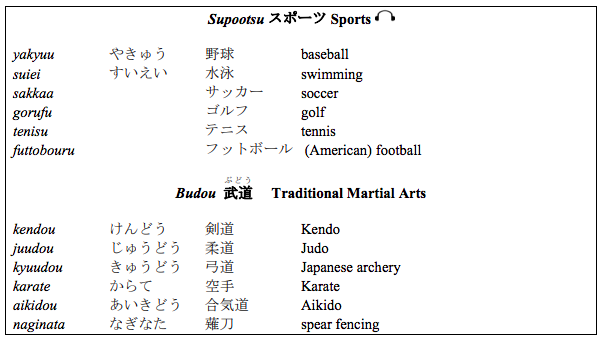4.3: Dialogue 3
- Page ID
- 31527
Yamada:野球 やきゅう と相撲 すもう とどっちの方 ほう がいい? Yakyuu to sumou to docchi no hou ga ii?
Which is better, baseball or sumo?
Emily:野球 やきゅう より、相撲 すもう の方 ほう がいい。 伝統的 でんとうてき なスポーツだし。 Yakyuu yori sumou no hou ga ii. Dentouteki na supootsu da shi.
I like sumo better than baseball because it is a traditional sport and…
Yamada:そうだね。せっかく日本にいるしね. Sou da ne. Sekkaku nihon ni iru shi ne.
I agree. And you are here in Japan after all, so…
Vocabulary
yakyuu やきゅう 野球 baseball
docchi no hou どっちのほう which alternative
X yori 〜より than ~; rather than ~
yakyuu yori やきゅうより 野球より rather than baseball
dentou でんとう 伝統 tradition
+bunka ぶんか 文化 culture
dentouteki (na) でんとうてき(な)伝統的 traditional
supootsu スポーツ sports
~shi 〜し and (among other reasons)
See 8-3-2
naruhodo なるほど I see; now I understand; it makes sense
sekkaku せっかく with much effort; take the trouble to do

Grammar Notes
Comparing Two or More Items
Earlier we learned the following patterns to compare two items:
Dochira ga ii desu ka. Which is better?
--X ga ii desu. X is better.
In this lesson we add the particle ~yori, ‘than’ and ~hou ‘this alternative of the two’. By using these, the sentences above can be restated as follows:
X to Y to dochira no hou ga ii desu ka. Which is better, X or Y?
--Y yori X no hou ga ii desu. X is better than Y.
When comparing more than three items you can specify the items compared by saying ‘X no naka de ‘ among X (the group)’ or listing up each member of the group like X to Y to Z no naka de ‘among X, Y, and Z’
Kono naka de dore ga ichiban ii desu ka. Among these, which is the best.
X to Y to Z no naka de dore ga ichiban ii desu ka.
Which is the best among X, Y, and Z?
--X ga ichiban ii desu. X is the best
Sentence + shi
Shi added to the end of a sentence means “and” and indicates that it’s one factor or one reason among others that leads to the conclusion under discussion.
Ame da shi. Because it’s raining, and… (so, I’m not going)
You can link more than two sentences using shi. The last sentence in the sequence can be either another reason or the conclusion. When asked about a restaurant for example, you may link three characteristics or two characteristics and a conclusion as follows.
Oishii shi, yasui shi, kirei desu yo.
The food is good, and it’s cheap and it’s clean.
Oishii shi, yasui shi, daisuki desu yo.
The food is good, and it’s cheap, so I like it a lot.
Since shi implies there are other reasons, it is often used to make a sentence sound inconclusive, thus polite in some cases, even when it is actually the only reason. You may notice younger speakers use shi-ending sentences a lot for this reason.


